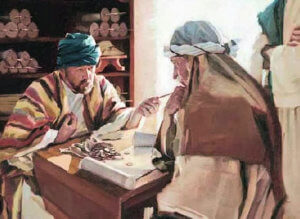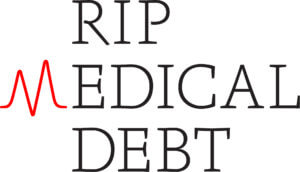
Forgive us our Debts
16 Then Jesus[a] said to the disciples, “There was a rich man who had a manager, and charges were brought to him that this man was squandering his property. 2 So he summoned him and said to him, ‘What is this that I hear about you? Give me an accounting of your management because you cannot be my manager any longer.’ 3 Then the manager said to himself, ‘What will I do, now that my master is taking the position away from me? I am not strong enough to dig, and I am ashamed to beg. 4 I have decided what to do so that, when I am dismissed as manager, people may welcome me into their homes.’ 5 So, summoning his master’s debtors one by one, he asked the first, ‘How much do you owe my master?’ 6 He answered, ‘A hundred jugs of olive oil.’ He said to him, ‘Take your bill, sit down quickly, and make it fifty.’ 7 Then he asked another, ‘And how much do you owe?’ He replied, ‘A hundred containers of wheat.’ He said to him, ‘Take your bill and make it eighty.’ 8 And his master commended the dishonest manager because he had acted shrewdly, for the children of this age are more shrewd in dealing with their own generation than are the children of light. 9 And I tell you, make friends for yourselves by means of dishonest wealth[b] so that when it is gone they may welcome you into the eternal homes.c “Whoever is faithful in a very little is faithful also in much, and whoever is dishonest in a very little is dishonest also in much. 11 If, then, you have not been faithful with the dishonest wealth,[d] who will entrust to you the true riches? 12 And if you have not been faithful with what belongs to another, who will give you what is your own? 13 No slave can serve two masters, for a slave will either hate the one and love the other or be devoted to the one and despise the other. You cannot serve God and wealth.”[e]
– Luke 16: 1-13
Confession is good for the soul, so let me begin with a confession. I’m not going to try to unravel or explain Jesus’ conclusions to the story he told. Instead I’m going to look at the eternal issue of debt and forgiveness.
 Jesus tells a story: a manager gets word that his wealthy boss, the Master, is going to fire him. So the manager decides to use his position to make friends with debtors, hoping that they’ll return his favor when he’s out of work. He discounts the amounts the debtors owe and collects them. Surprisingly, perhaps, the master commends the manager for his shrewdness.
Jesus tells a story: a manager gets word that his wealthy boss, the Master, is going to fire him. So the manager decides to use his position to make friends with debtors, hoping that they’ll return his favor when he’s out of work. He discounts the amounts the debtors owe and collects them. Surprisingly, perhaps, the master commends the manager for his shrewdness.
Credit in first century Palestine was a riddled with corruption. Borrowers weren’t protected by law. Individual creditors were often crooked, predatory. They milked needy, illiterate customers with tricks like folding interest into the principal. It seems the rich Master in Jesus’s story was of that ilk. After all, he was satisfied with the manager’s discounted collections. So they must have been what was really due to him. Happy to have the goods in hand instead of an IOU, the Master forgave the rest. He had the power to do that.
History of Debt Forgiveness
 Forgiving debt is a privilege of the powerful. As such has a long tradition. In ancient Babylon, King Hammurabi wiped the slate clean of debt about every ten years. It gave relief to farmers, who were ruined in times of drought, and freedom to those enslaved because of debt. Hammurabi’s Code of Law, written nearly 4,000 years ago, included several clauses about debt forgiveness. After coming out of their Babylonian captivity, the Israelites incorporated it into their own law; Leviticus 25 prescribes a Jubilee year, every fifty years, in which all debts are erased. Wise leaders in antiquity learned that debt forgiveness restores the economic equity that undergirds a stable society.
Forgiving debt is a privilege of the powerful. As such has a long tradition. In ancient Babylon, King Hammurabi wiped the slate clean of debt about every ten years. It gave relief to farmers, who were ruined in times of drought, and freedom to those enslaved because of debt. Hammurabi’s Code of Law, written nearly 4,000 years ago, included several clauses about debt forgiveness. After coming out of their Babylonian captivity, the Israelites incorporated it into their own law; Leviticus 25 prescribes a Jubilee year, every fifty years, in which all debts are erased. Wise leaders in antiquity learned that debt forgiveness restores the economic equity that undergirds a stable society.
The Rev. Dr. William Barber wrote: “The children of Israel came to understand this practice as God’s design.” He continued, “The tradition of debt forgiveness, which is shared by Christians, Jews, and Muslims alike, offers a powerful vision for a way forward from the historic inequality that currently harms our economy.”
Debt is the root of economic inequality today, just as it was in antiquity. I want to focus on just two sources of debt in our own time and place.
Student Loan Debt Forgiveness
The Rev. Barber, who won a MacArthur grant for his work leading the Poor People’s campaign, was writing in Time Magazine a couple of weeks ago in support of the government’s student loan debt forgiveness.
Not having children, I was unaware how about the massive increases in the cost of higher education—particularly in state universities. When I graduated in 1970, a Texas resident’s annual tuition for a full course load at the University of Texas, Austin, was a flat $100. You heard it correctly: $50/semester! Today it’s over 100 times more: up to $13,000/year—way outpacing inflation. Why? Because the Texas legislature has chosen to spend the state’s lavish oil lease income in other ways.
In my parents’ and my generation, higher education was much more affordable thanks to Federal programs like the GI Bill, and generous state subsidies for public universities. The states’ cutbacks came just when more jobs required a college degree and when more needy young people were enrolling. Pell Grants, designed to help the neediest, haven’t kept pace. An example: in 1973 the $1400 maximum Pell Grant would have covered a year’s tuition in Austin and the then-modest rents– with money to spare. Today the Pell maximum covers about half the annual tuition for UT; nothing for the rest including astronomical Austin rents.
In that light, I can see how debt forgiveness of $10,000 or even $20,000 (for Pell Grantees) is modest. Using its power as the loan guarantor, the US government made this gesture to be a small part of the solution, to help restore economic equity– as Hammurabi and other wise rulers have throughout history.
Medical Debt
 Medical debt is far greater and more widespread, effecting one in three American families and leading many of them into bankruptcy–with all of its long term devastating consequences. And the creditors are so numerous! It’s an unholy mess that only an expert could unravel.
Medical debt is far greater and more widespread, effecting one in three American families and leading many of them into bankruptcy–with all of its long term devastating consequences. And the creditors are so numerous! It’s an unholy mess that only an expert could unravel.
Good news: that’s just what happened. In 2014 two former debt collections executives used their deep experience to found a non-profit called RIP Medical Debt. They buy large bundles of debt and pay them off for about a penny on the dollar. They erase medical debts for households whose earnings are less than 4x the federal poverty level, or whose debts are at least 5% of their annual income. To date, with donations from over three million people, RIP Medical Debt has cleared over $7 billion in debt. And their good work goes on.
Still and always, debt is a reality; it’s part of the web of life. Jesus knew that. That’s why there aren’t explicit heroes or villains in the story of the dishonest manager. All were caught in a corrupt system. Most were victims. Only the Master had relative power, because of his wealth.
In telling this story, Jesus did not condemn the Master or any body else. Jesus accepted the reality. Jesus forgave.
As should we. “You cannot serve God and wealth”. Far too many Americans struggle to make ends meet. Debt is part of human reality. Jesus invites us to accept that fact and to rise above it, not to let our own financial debts or those of others enslave our spirits with shame or judgment.
 Instead, Jesus invites us to entrust it all to God–along with our minds, our hearts, our spirits. No matter who we are, no matter how much wealth or material debt we may have, we are all equal in the eyes of God, and equally indebted to the God of life.
Instead, Jesus invites us to entrust it all to God–along with our minds, our hearts, our spirits. No matter who we are, no matter how much wealth or material debt we may have, we are all equal in the eyes of God, and equally indebted to the God of life.
Daily, as we recite the Lord’s Prayer, we ask God’s forgiveness for our sins, for our debts of all kinds; and we promise to forgive those who are indebted to us. Holding fast to that, let us have compassion for those who are weighed down with debt, knowing that God’s forgiveness embraces them, their creditors, and us all.
May God give us the grace freely to accept our own forgiveness, and as freely, to forgive others in return.
